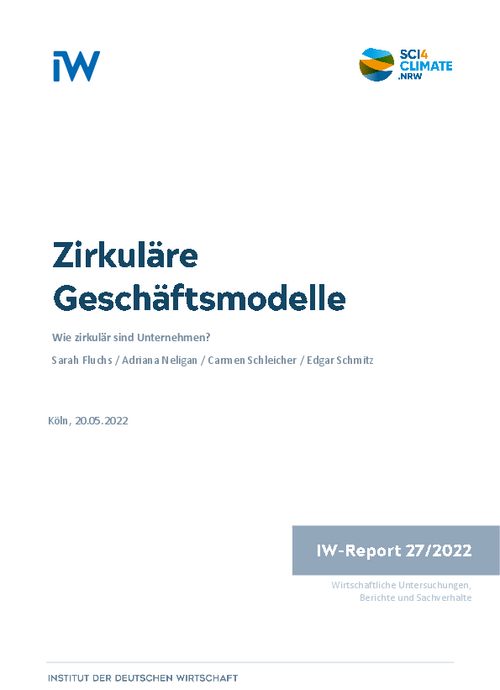On the way to climate neutrality, the transition from a linear economy to a circular economy plays an important role. Resource cycles can be implemented in different ways in companies.

Circular Business Models: How circular are companies?

On the way to climate neutrality, the transition from a linear economy to a circular economy plays an important role. Resource cycles can be implemented in different ways in companies.
It becomes necessary to look at the entire life cycle with new approaches for the essential stages - design, production, use and reuse of products. Production processes, but also product and service systems, must be adapted and there is the need for new and/or modified business models that meet these requirements. To preserve value for as long as possible and to conserve resources while maintaining competitiveness circular business models that are strategically oriented towards enabling, closing, creating or extending resource cycles (four circular strategies) become relevant. These circular strategies are implemented by taking concrete measures.
Survey results from an IW company survey show that companies in the manufacturing sector have not yet comprehensively pursued circularity-oriented goals and developed strategies based on them. For the empirical analysis, the four circular strategies are summarised into three strategies: Closing loops, creating/enabling loops and extending loops. There are also differences between companies depending on whether they pursue a singular specific strategy or holistically all three circular strategies. The main results of the company survey for the manufacturing sector are:
- Many industrial companies are at the beginning of circular business models: more than one third of the manufacturing sector has no circular strategy so far. Only every fourth company in the manufacturing sector is pursuing all three circular strategies. Another quarter concentrates on one singular circular strategy.
- Manufacturing firms with a holistic approach with three circular strategies do not only focus on circularity: Holistic circular strategies not only ensure that circular measures in the company go beyond the usual level, but also that overarching goals such as cost optimisation, environmental and climate protection and sustainability are given greater attention.
- Networking, including innovation networks, and new business models are central. Networking and new business models are more important in holistic circular strategies: Companies with three circular strategies tend to focus on new markets or business models and on networking in the value chain. In addition, innovation networks with suppliers and direct product approaches play a more important role than in other companies. At the same time, however, it is also evident that research and development (R&D) is more anchored in companies that have at least one circular strategy. Yet, it is the companies with one singular circular strategy which develop new products and processes most frequently. Furthermore, there is no clear correlation between digitalisation and holistic circular strategies.
- Industrial companies with holistic circular strategies are more successful: Companies with at least one circular strategy are more successful than companies without such a strategy. Every second company with three circular strategies is highly successful, while this is less the case for companies with no or fewer circular strategies.

Circular Business Models: How circular are companies?

More on the topic
Is the EU Fit for 55 and Beyond?
Ursula von der Leyen was elected President of the European Commission by the European Parliament in July 2019. She assumed office in November 2019 and unveiled the European Green Deal in December 2019 (European Commission, 2023a) as a focal point of European ...
IW
Compendium 5.4: CO2 Regulation of Road Transport in Europe
With the Compendium CO2 Regulation in Europe, the IW has been providing the interested public with a comprehensive collection of data on the development of CO2 emissions from passenger car traffic in the European Union, as well as on the applicable regulatory ...
IW